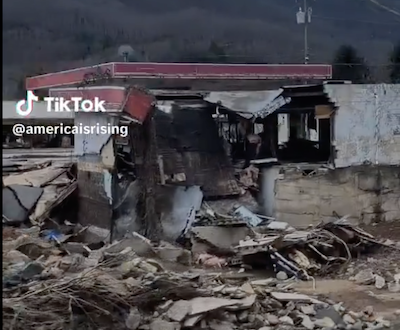In the aftermath of the tragedy that was Hurricane Helene, FEMA and North Carolina’s response has been marred by significant – some would say – unforgivable – shortcomings.
Thanksgiving day in WNC.
— Lisa
62 days since the storm hit. Would you think it would still look like this? I sure didn’t. It’s obvious that the state and federal government have not come to help and don’t count on them for any help. They are worthless. The American people have stepped… pic.twitter.com/zQ50qwSIY8(@Lisahudsonchow7) November 29, 2024
Despite the deployment of some federal personnel, many survivors are still residing in tents amidst freezing conditions, with aid failing to reach these desperate individuals in a timely manner.
Update on Bakersville, NC
— FoxyFarmer
This drone footage was taken yesterday.
Obviously our Appalachian region has undergone a complete topographical shift that is impossible to put into words….
Just violent and devastating….pic.twitter.com/YZ4GBEta8A
(@GardensR4Health) November 25, 2024
The slow pace of aid distribution has left many without basic necessities like shelter and warmth, particularly as snow falls.
— Matt Van Swol (@matt_vanswol) November 28, 2024
#BREAKING: On Thanksgiving Day, @WLOS_13 released their documentary short on Hurricane Helene.
These are some of the most powerful interviews I’ve seen in #WNC to date, brought me to tears. pic.twitter.com/5rvIZ0fFIm
The Amish rushed to help and constructed tiny houses for Hurricane Helene survivors, providing swift shelter. However, these were condemned by authorities for not meeting federal codes, leaving many still displaced during bitter winter conditions. This act has been justly criticized as prioritizing regulations over the immediate needs of those affected by disaster. It is spiteful and uncaring.
Hey Roy Cooper @NC_Governor where is the 1.1 billion dollar aid package that was passed for WNC? Why are our people in tents in this freezing weather? This is unacceptable and inexcusable!
—pic.twitter.com/HSZFSGyM4Z
Dennis
(@clovis1931) November 25, 2024
Fox News raised $8 million for the Red Cross to use in the Western North Carolina area of devastation, although residents claim that no aid from the donation had reached the area as of late November 2024.
We have seen a lot of videos showing us the horrors that the people in WNC are living through now. Just listen to the number of unalived people that just one person has brought down in body bags.
— Lisa
The media has been reporting that only a 102 died. It’s always been a lie because… pic.twitter.com/T3OO4ZVcoI(@Lisahudsonchow7) November 28, 2024
Additionally, the handling of deceased victims has been criticized, with reports of bodies not being promptly recovered or identified, leading to further distress for families.
So…although my organization is still committed to our agreement with Fox News Investigative team, I felt it prudent to post this video from and actual SARS volunteer who has physically found 52 bodies in NC. These bodies have not been added to the official count of the sham of… pic.twitter.com/GqTiLLFU59
— Ralph Avallone (@The_Captain1968) November 28, 2024
The bureaucratic red tape and perceived political bias in aid distribution have exacerbated the suffering, as survivors struggle with inadequate support and the harsh realities of recovery.
Happy Thanksgiving to everyone except Joe Biden who has sent $300 billion to countries overseas…
— Matt Van Swol (@matt_vanswol) November 28, 2024
…while #WNC looks like this on Thanksgiving Day pic.twitter.com/eV6JcX4HLH
Private help will save them
— Matt Van Swol (@matt_vanswol) November 26, 2024
#BREAKING: Samaritan’s Purse has just announced it will build and deliver over 1,000 homes to #WNC.
According to Franklin Graham, “I hate to say it, but the recovery process will take years.”
pic.twitter.com/lmkv3yCwWA
GROK sums up the Eminent Domain issue:
— Matt Van Swol (@matt_vanswol) November 27, 2024
#BREAKING: Officials are reportedly "not answering the phone" of desperate #WNC victims, trying to get their donated campers permitted for electricity.
No permit. No electricity. No heat.
Even the reporter admits, "I tried calling for days and only got an answering machine." pic.twitter.com/E3I0j6aPIK
Eminent domain issues in areas affected by Hurricane Helene primarily revolve around the government’s potential use of this power to seize property for recovery and redevelopment projects. Could this explain their spiteful response?
Here are the key points:
- Government Overreach: There’s concern over governments using eminent domain not strictly for public use but to facilitate private economic development, echoing the controversial Kelo v. New London case. This is seen as a potential misuse for transferring property to developers under the guise of economic revitalization post-disaster.
- Insufficient Compensation: Property owners often argue that the compensation offered is inadequate, not reflecting the emotional or community value of their property, especially when it comes to homes with deep personal or familial history.
- Community Disruption: The use of eminent domain can lead to the displacement of communities, particularly vulnerable populations, which might never fully recover from the initial disaster, exacerbating social and economic divides.
- Lack of Due Process: There are claims of insufficient notice or opportunity for property owners to contest the taking, which can feel coercive, especially when owners are already dealing with the aftermath of a hurricane.
- Blight and Redevelopment: Areas might be labeled as “blighted” to justify eminent domain, yet this label can be applied too broadly, affecting properties that are not actually blighted, thereby serving private interests more than public ones.
These issues create a contentious environment where property rights are weighed against public interest, with criticisms often focusing on the fairness, process, and ultimate beneficiaries of eminent domain actions in disaster recovery scenarios.




